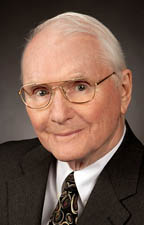Heroic Mechanical Engineering alumnus awarded honorary doctorate
 Colonel (Col) Ben Pollard received an honorary doctorate in May of 2012 to celebrate his exemplary leadership and his dedication to education. He graduated from Purdue in 1954 with a Bachelor’s in Agricultural Engineering and enough mechanical engineering courses to supplement his first job at Caterpillar.
Colonel (Col) Ben Pollard received an honorary doctorate in May of 2012 to celebrate his exemplary leadership and his dedication to education. He graduated from Purdue in 1954 with a Bachelor’s in Agricultural Engineering and enough mechanical engineering courses to supplement his first job at Caterpillar.
In 1955 Col Pollard joined the Air Force as part of an initial three-year ROTC commitment. After flight training and serving four years as a flight instructor and test pilot, he returned to Purdue for his Master's degree in Mechanical Engineering. The Col was then selected to teach thermodynamics, gas dynamics and propulsion in the Aeronautics Department (Aero) at the Air Force Academy (AFA).
While at the Academy, Col Pollard played a part in revising the Aero, academic curriculum. He participated in a program called “Majors For All,” which caused every cadets to add one of a variety of accredited majors to their core curriculum--a first at any military academy. He then developed new Aero courses to teach basic aeronautic principles to students without a strong background in engineering. Because there were no such textbooks available, he wrote them himself.
The Col subsequently went to Vietnam as a fighter pilot flying arguably the most dangerous mission in that war. When his F-105 was shot down in the spring of 1967, he and his fellow POWs were held captive in the infamous “Hanoi Hilton” prison system: noted for its unspeakable living conditions and treatment. Captives in the “Hilton” were regularly tortured in an attempt to break their determination to resist the will of their captors. The Col suffered severe injuries, and was subjected to torture, starvation, illness and solitary confinement.
After three and one-half years of misery, conditions in the “Hilton” in 1970 began to gradually improve. Slowly, ever so slowly, interaction between American prisoners became possible. After years of torture, starvation and solitary confinement, prisoners at last were permitted to speak to one another. Some POWs approached him, and asked him to teach an aeronautics course—both to expand their minds and pass the endless hours of boredom that was life in the Hanoi Hilton.
He began preparing to teach this aero course while other POWs taught additional desired courses. Before the Col could teach aero engineering subjects, he needed to teach his “students” algebra and calculus. Without books, calculators, writing utensils and only crude purloined paper, he, with the help of two other POWs, had to improvise crude pens and ink plus the math teaching “materials.” They then constructed mathematical aids and course materials from memory including manually calculating five-place log and trig tables, building crude slide rules and teaching algebra and calculus!
Only then could the Col begin teaching what he calls “Aerodynamics, Hanoi Hilton Style.” The course covered thermo, gas dynamics, and propulsion including the fundamentals of jet and rocket engines—the reason the log tables were so necessary. He was surprised by the interest of his fellow POWs/students, who would not only have to endure the conditions of prison life, but would also have to work very hard to understand the various subjects. He was able to keep his students motivated, and his knowledge of mechanical engineering improved the morale of his comrades. He ultimately finished his course some 90+ lessons later--all from memory.
After his release in 1973, the Col served first as an associate professor in the Department of Aeronautics at the AFA for one year. He subsequently became the Deputy Commandant of Military Instruction at the Academy. As such he was responsible for all formal military instruction at the AFA. When Congress enacted legislation to bring women to the Academies, the Col embraced this change, advocating equality and offering solutions to assure equitable treatment for all cadets. His progressive approach to education and change made him irreplaceable. In fact, when he left his position in 1976, two Deputy Commandants were required to fill his position. He remembers with pride his part in co-commanding the summer training for the first class with cadet women at the Academy.
In 1976 he became Commander of the AFA Preparatory School for the next five years.
The Col retired in 1981 after 27 years of service to his country. During his Air Force career, he received two Silver Stars, two Legion of Merit Medals, two Bronze Star Medals with the “V” device to signify combat heroism, two Purple Hearts, an Air Medal plus various other awards
After retiring from the Air Force in 1981, Pollard served as a vice president of STARNET, a small pioneering telecommunication company. He also served as president of NAMPOW Inc., the Vietnam POW Organization.
In addition to his honorary doctorate, the Col has received the American Society for Engineering Education’s AIAA Education Achievement Award. He received Purdue’s Distinguished Engineering Alumni Award and was selected as an Old Master in 1979, an honor that recognizes exceptional individuals who have made significant contributions in their professional fields. In 1991, the School of Mechanical Engineering recognized Pollard’s achievements with the Outstanding Mechanical Engineer Award. He is an AIAA Fellow as well as Distinguished Speaker for the AIAA. He has never stopped teaching, advising, volunteering, computing or consulting. His passion, life experiences and engineering expertise have established Col. (Ret.) Ben Pollard as an exemplary leader, innovator, educator, and Boilermaker.
